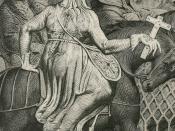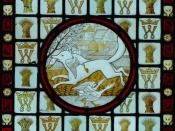Irony is the general name given to literary techniques that involve
surprising, interesting,or amusing contradictions. 1 Two stories that
serve as excellent demonstrations of irony are "The Pardoners Tale" and
"The Nun's Priest's Tale," both from Chaucer's The Canterbury Tales.
Although these two stories are very different, they both use irony to teach
a lesson.
Of the stories, "The Pardoners Tale" displays the most irony. First
and foremost, the entire telling of the story is ironic, considering just
who is the teller. The Pardoner uses this story to speak out against many
social problems, all of which he himself is guilty of. He preaches about
drunkenness, while he is drunk, blasphemy, as he attempts to sell fake
religious relics, and greed, when he himself is amazingly greedy. Yet
there are also many ironic situations in the story itself. The irony starts
when, in the begining of the story, the three rioters make a pact to "be
brothers" and "each defend the others" and "to live and die for one
another" in protection from Death, (lines 37-43) and then in going out to
fulfill their vow, they end up finding money, and killing each other over it.
Even more ironic, is how they end up killing each other. After finding the
money, the men plan to stay with it until it becomes dark and they can
safely take it away. To tide themselves over until then, they send the youngest one out to get food and wine, and while he is away they plan to
kill for his share of the money. Ironically, the youngest one is planning
the same thing so he slips poison into the drinks of his companions. When
he returns, he is attacked and stabbed to death by the other men...



Irony
I have recently read "The Canterbury Tales" and I totaly agree witht the author of this paper when he or she says that these two "tales" are full of irony.
Just like in the Pardoner's Tale, the old man tells the three young men that death is hiding under a tree in the goard. For those of you who don't know, the three young me are looking to kill death. When the young men come accross the gold they are worried that people will think they stole the gold, so they decide to get that night. They youngest left to go to the appotohcary and bought poision so he could kill his friends and take the gold for him self. The other two planned to kill the youngest when he returns by wrestling with him in a play fasion and later stabbing him with a knife. The irony sets in when the two young men start to leave they drink the poision which is mixed with some sort of drink and they die. So just as the pardoner said, "Money is the root of all evil."
4 out of 4 people found this comment useful.